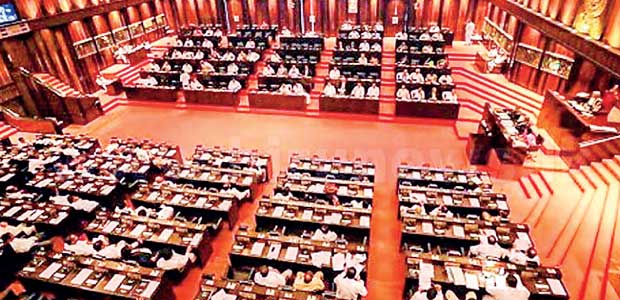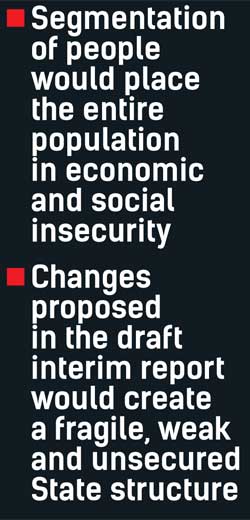Reply To:
Name - Reply Comment
Last Updated : 2024-05-08 04:24:00

 It remained a mystery to the public. We found it disclosed in the Report of the Office of the UNHCR on Sri Lanka, presented to the 34th Session of the HR Council held in Geneva between February 27 and March 24, 2017. The revelation was made in the following words; “(Also) on November 19, the Steering Committee of the Constitutional Assembly presented its first interim report to the Constitutional Assembly”. It is first (DRAFT) “Interim Report” presented to the Steering Committee.
It remained a mystery to the public. We found it disclosed in the Report of the Office of the UNHCR on Sri Lanka, presented to the 34th Session of the HR Council held in Geneva between February 27 and March 24, 2017. The revelation was made in the following words; “(Also) on November 19, the Steering Committee of the Constitutional Assembly presented its first interim report to the Constitutional Assembly”. It is first (DRAFT) “Interim Report” presented to the Steering Committee.
On April 3, 2017 the JO (Joint Opposition) submitted written objections to that draft interim report. Amongst other organizations, the National Joint Committee published a comprehensive analysis in early May, explaining the detrimental impact that report would have on our nation.
Two schools of thought could be identified in the local constitutional making process. The demand of the nationalist and patriotic movements is to preserve the unitary State
A completely different State structure is suggested in the draft report. It recommends abolishing the concurrent list, limiting the powers of the central government, assigning Provinces with more executive and legislative powers that the centre has very little (or no) control of, creating a constitutional court with judges appointed outside the normal judicial system, establishing a second chamber (largely consisting of the representatives of Provinces), abolishing the Executive Presidency and effecting changes in the electoral system.
The culminating effect of such changes is the creation of a country with enormously autonomous units at the peripheral/provincial level. The level of devolution of power, as proposed in the report, may exceed the limits of a federal structure and may reach a confederal or other unpredictable form that facilitates the peripheral/provincial units to function independently of the centre. In terms of International Law, a new entity can gain independence either by constitutional means or by force (see International Law - Malcolm and Shaw (6th Edition) (2010) page 493; on two methods of gaining independence as a new state). To achieve this objective, the unitary structure should completely be abolished.
In order to abolish the Unitary State, the compilers of the report import (for the first time in the constitutional history of Sri Lanka) “the Principle of Subsidiarity”. There is no analysis done so far, as to its practical applicability to the conditions here. Unknown authors of the draft interim report completely rely on the Centre-Periphery Sub-Committee Report (chaired by D. Sithadthan, M.P.) in accepting this principle. The CP sub-committee report reads as follows:
“......... This suggestion was based on the principle of subsidiarity i.e. whatever the lowest level of governing institution can handle should be left with that body or unit and the rest should go to the next tier and so on. This notion is contrary to the present model of transferring the political power from the centre to sub-national units. .........” (See page 4) (emphasis mine).
It is interesting to note that the compiler fearlessly admits that this principle goes against the present model. In other words the Unitary State structure is declared to be abolished.
“Subsidiarity” is the only principle recommended in the two reports (both the CP sub-committee report and the draft interim report). No alternative view (supporting the Unitary State) has been proposed for  consideration.
consideration.
How this principle would work could better be understood by studying its functionality in the international context. According to constitutional experts it is a vague term. There is no agreed definition explaining its limitations. Therefore, this principle can be interpreted and applied in different ways to achieve spontaneous political interests.
Historically, the origin of this principle is in the Catholic Church (West) and used to legitimize the hierarchical power structure of the Church. Today this principle is embedded into Article 5 of the Treaty of the European Union which governs the relationship between the Community and its Member States. Therefore, in the present context, ‘Subsidiarity’ is a principle that can be conveniently and best applied in relating a (weak) administrative centre with more autonomous territories with powers to function as sovereign states of any degree. Are we to have several independent states on our land too?
The first eight (1-8) Articles (Sections) of our Constitution deal with characteristics of Sri Lanka and its international personality as a sovereign State. Article 2 provides that Sri Lanka is a Unitary State. Article 3 treats the entire population as one unit of sovereignty, assuring that all (as one unit of community) are equal, inseparable and indivisible. Article 4 provides the manner in which the sovereignty power flows through five (5) separate channels; (legislative, executive, judiciary, fundamental rights and franchise). We call it ‘separation of power’. The Constitution has given birth to Sri Lanka as a Strong Unitary State; comprising a free land area of 25 districts and surrounded by its territorial waters.
What is now proposed in the draft interim report is pathetic. Present article 2 (which secures a unitary state) is to be removed. Present article 4 dealing with the separation of sovereign power will also be removed. The replacement is unspecific, to say ‘as provided in the (proposed) constitution’. The (boundary of the) territory is defined as ‘recognized by the international law’ and comprising of ‘Provinces’ (supposed to be) listed in a schedule which is not disclosed in the draft report (Provinces are not recognized in defining the territory in the present Constitution). The definition proposed in the draft to specify the territory is vague and fragile. Therefore, the changes proposed in the draft interim report would finally create a fragile, weak and unsecured State structure, machinery of the government and a territory with no identifiable international personality as an autonomous state (Read the report of the National Joint Committee for a comprehensive analysis on the draft interim report).
According to JO, the ‘author’ of the ‘draft interim report’ is unknown. Whoever the author/s may be, his/their intentions are clear; to turn Sri Lanka into a land with several loosely-linked self-governing states, which can freely exercise sovereign powers. I do not want to call it Federal or Confederal as the final outcome of the proposed structure may be more disastrous than that. The reasons to turn a Strong State into a weak and unsecured one, leads to a discussion beyond the scope of this article. However, in this weak and unsafe land, the people who are praying to live in unity will finally be separated from each other. Vicious politicians and NGOs may indoctrinate people with fabricated and unrealistic reasons to justify separation. For them, it is a profitable business; for the people, a deadly battle.
Two schools of thought could be identified in the local constitutional making process. The demand of the nationalist and patriotic movements is to preserve the unitary State. Such a move would strengthen the solidarity of people and preserve national resources. A unitary system of government would facilitate the entire community to have a “quantum jump”, as one nation in the process of development. There are historical and practical reasons to accept this thinking. It is simple logic that what modern-day people need are rapid economic development, upliftment of living standards, dignity, peace and contentment. To achieve these, all we need is a dedicated, honest and patriotic political leadership; not constitutional changes. The present constitution is capable of providing a sound platform to achieve that common call of the people.
The opposite concept encourages division and separation. Segmentation of people on the basis of ethnicity, geographical basis or any other ground would definitely place the entire population in economic and social insecurity. Such an environment would be conducive only for those eagerly waiting to exploit the economy and national resources. This is the kind of system that is proposed in the draft interim report.
On March 9, 2016 the Parliament passed a resolution converting the entire Parliament into a Constitutional Assembly. It is nothing but a Select Committee of the Parliament (See Hansard 9.3.2016 column 213). However, some experts challenge the legality of the Constitutional Assembly on several grounds; including, (a) absence of people’s mandate to enact a new constitution (b) Constitutional illegality in the appointment of the Leader of the Opposition; whose functions in that capacity in the Steering Committee have also become illegal and void (c) Absence of an inbuilt mechanism to obtain people’s opinions directly (Lal Wijenayaka’s Committee was not appointed by the Parliament) (d) serious violations of the resolution of the Parliament.
According to JO, the ‘author’ of the ‘draft interim report’ is unknown. Whoever the author/s may be, his/their intentions are clear; to turn Sri Lanka into a land with several loosely-linked self-governing states, which can freely exercise sovereign powers
According to the resolution upon the consideration of the Reports of the Sub-Committees appointed under Clause 5(b) (by the Constitutional Assembly) and the report of the Public Representations Committee, the Steering Committee shall submit a Report to the Constitutional Assembly. Such a Report may (According to Sinhala text “shall”) be accompanied by a Draft Constitution (Clause 17). What practically has happened today for the Steering Committee is to discuss a report (draft interim report) based on visions and intentions of TNA (Interim report is based on the Centre Periphery Sub Committee report, which mainly comprises views of its chairman-TNA MP). Soon the steering committee will have to submit its report with a draft constitution to the Constitutional Assembly. If the Steering Committee fails to comply with that mandatory requirement, the entire process shall become a nullity. On the other hand if the report and the draft constitution are to be based on the “draft interim report”, consequences would be unthinkably disastrous.

Add comment
Comments will be edited (grammar, spelling and slang) and authorized at the discretion of Daily Mirror online. The website also has the right not to publish selected comments.
Reply To:
Name - Reply Comment
US authorities are currently reviewing the manifest of every cargo aboard MV
On March 26, a couple arriving from Thailand was arrested with 88 live animal
According to villagers from Naula-Moragolla out of 105 families 80 can afford
Is the situation in Sri Lanka so grim that locals harbour hope that they coul
07 May 2024 - 2 - 1407
06 May 2024 - 3 - 1228